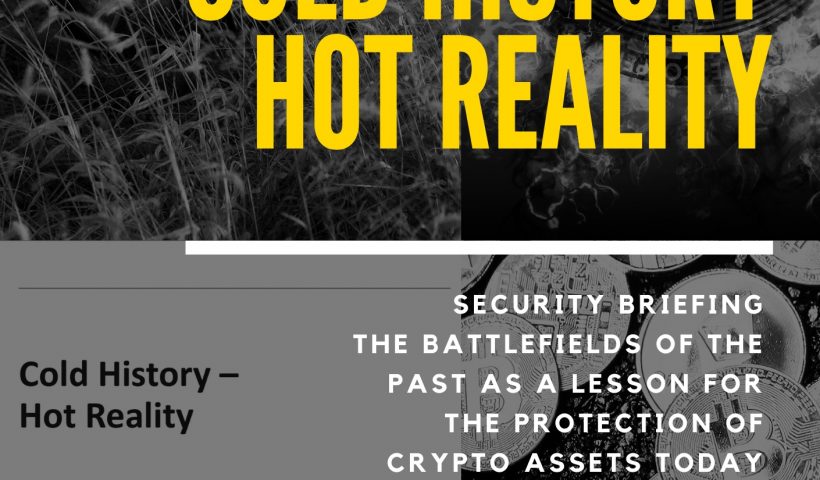SECURITY BRIEFING. The battlefields of the past as a lesson for the protection of crypto assets today.
COLD HISTORY. HOT REALITY is a contribution to The Yearbook 2022 “Treasury and Private Banking”, edited by Roland Eller. The book is a well-known platform for building the bridge from the traditional to the new decentralised financial world.
COLD HISTORY. HOT REALITY by Jochen Werne is a plea for openness to new technologies, embedded in a historical-social security briefing on money, power and the indispensable need to protect assets. The battlefields of the past provide the framework for lessons on protecting crypto assets in our technology-dominated world and help us gain a basic understanding of the opportunities and threats in our new cyber reality.
COLD HISTORY – HOT REALITY was particularly inspired by conversations and articles from the following thought leaders, to whom I am deeply indebted.
Raimundo Castilla – CEO Prosegur Custodia Digitales, Ghislain D’Hoop – Ambassador of Belgium to Austria, Slovakia, Slovenia and Bosnia and Herzegovina, Permanent Representative to the United Nations, Roland Eller – Founder and CEO of Roland Eller Consulting, Niall Ferguson – Milbank Family Senior Fellow at the Hoover Institution at Stanford University, Christoph Impekoven – Co-Founder micobo GmbH, Benon Janos – CFO flatexDEGIRO Bank AG, Lior Lamesh – Founder & CEO of GK8, Bernd Lehmann – Historian, Commander of the German Navy (ret.), Rakesh Sharma – Author, Thomas Vartanian – Author and Counselor, Heath White – CEO Prosegur Germany, Johannes Winter – Managing Director of the Platform „Learning Systems“ – Germany‘s AI-platform
Preview and excerpt from Chapter I of “COLD HISTORY – HOT REALITY”
WHAT IS PAST IS PROLOGUE
Impressive and powerful, the words “What is past is prologue” are chiselled in white marble at the foot of the statue in front of the National Archives in Washington D.C.. The famous quote from William Shakespeare’s “The Tempest” is a haunting reminder to everyone that history provides the context for the present.
We live in a present that is changing at breathtaking speed. This fact concerns us daily, but if we do not take the time for a little history lesson, we are doomed to painfully repeat the mistakes of the past. More than aware of this realisation is the former CEO of tech giant Alphabet, Google’s parent company. He dedicated the following note to the New York Times bestseller, “The Square and the Tower: Networks and Power, from the Freemasons to Facebook”: “Niall Ferguson … brilliantly illuminates the great power struggle between networks and hierarchies that rages around the world today. As a software engineer familiar with the theory and practice of networks, I was deeply impressed by the insights of this book. Silicon Valley needed a history lesson and Ferguson delivered.” Not only is Eric Schmidt impressed, but many of the thoughts in this article are inspired by Niall Ferguson’s illuminating papers and lectures.
The beauty of the past is that everything that has already happened, successes and failures, can always be explained in detail and serve as lessons for future challenges. Successful leaders use this knowledge to develop solutions to the problems of the future and to develop communication strategies to make their visions understood by others.
This article was written at a time when humanity is in the final stages of a global pandemic that is saddling countries with an unprecedented debt burden. At the same time, a “New Cold War” is emerging and an arms race for technological supremacy has begun. With new possibilities, the old equilibrium is shaken and a new, albeit familiar, competition for power and money begins. All this at a time when crypto-blockchain-based monetary systems are rapidly becoming a new reality.
The article, with its historical analogies, aims to give the reader a better understanding of how money, power and security are closely intertwined. This helps to put quite complex issues into perspective and gives a clear view of the dangers and opportunities of our changing reality.
The world and change are not to be feared, but understood.
Jochen Werne
The new YEARBOOK will be available in Spring 2022. Find out more HERE

